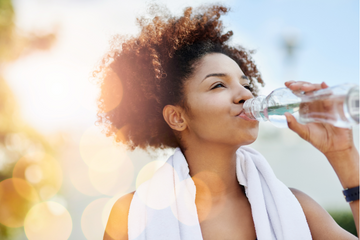As summer draws to a close, it's crucial to pay attention to hydration more than ever. The hotter months often lead to increased perspiration and a higher risk of dehydration, which can impact our overall health and well-being.
At Shield Vitamins, we emphasize the importance of staying hydrated with evidence-based strategies to support your body's needs. We’ve put together a comprehensive guide to help you maintain optimal hydration levels as we transition from summer to fall.
The Science Behind Hydration
Water is essential for our bodies to function properly. It regulates body temperature, aids in digestion, cushions joints, and transports nutrients throughout the body. During summer, higher temperatures and outdoor activities can lead to increased water loss through sweat. Dehydration occurs when the body loses more water than it takes in, and this imbalance can have serious consequences ranging from fatigue and headaches to more severe complications like heatstroke.
The amount of water each person needs varies based on factors such as age, weight, activity level, and climate. As a general guideline, aiming for about 8-10 cups (64-80 ounces) of water per day is recommended for most adults. However, this can increase significantly during hot weather or intense physical activity.
Balancing Hydration With Electrolytes
Electrolytes play a crucial role in maintaining hydration levels and are lost through sweat. They include minerals such as sodium, potassium, calcium, and magnesium, which help regulate fluid balance in the body. When we sweat excessively, especially during summer, electrolyte levels can become depleted, leading to muscle cramps, fatigue, and impaired performance.
To replenish electrolytes, consider incorporating foods rich in these minerals into your diet, such as bananas (potassium), leafy greens (calcium), and nuts/seeds (magnesium). Additionally, electrolyte-enhanced beverages or supplements can be beneficial, especially for those engaging in prolonged or intense physical activities.
Hydration and Skin Health
Beyond internal health, hydration is critical for maintaining skin health and appearance. Dehydrated skin can appear dull, dry, and more prone to wrinkles. During summer, exposure to sun and chlorine from swimming pools can further dehydrate the skin.
In addition to drinking adequate water, topical hydration through moisturizers containing humectants like hyaluronic acid can help attract and retain moisture in the skin. A diet rich in fruits and vegetables, which are high in antioxidants and vitamins A, C, and E, can also support skin hydration and overall health.
The Role of Vitamins in Hydration
Vitamins play a crucial role in maintaining proper hydration, as they are essential for various biochemical processes that regulate fluid balance in the body. For instance, Vitamin C enhances the absorption of water in the intestines, ensuring efficient hydration. B vitamins, particularly B6, are vital for electrolyte balance, aiding in the regulation of sodium and potassium levels, which are critical for maintaining cellular hydration.
Additionally, Vitamin D influences kidney function and the regulation of water and electrolyte balance. By supporting these functions, vitamins help maintain optimal hydration levels, crucial for overall health and well-being. Regular intake of these vitamins ensures that the body's hydration mechanisms function efficiently, particularly during periods of increased physical activity or heat exposure.
Practical End-of-Summer Hydration Tips
As summer gives way to cooler temperatures, it's important to adjust your hydration routine accordingly:
1. Drink Water Frequently: Encourage regular water intake throughout the day, even if thirst isn’t pronounced. Aim for at least 8-10 glasses of water daily for adults, adjusting based on individual needs and activity levels.
2. Opt for Electrolyte-Rich Beverages: Choose beverages that contain electrolytes to replenish those lost through sweat. This includes sports drinks or electrolyte-enhanced water, especially after vigorous exercise or extended outdoor activities.
3. Eat Water-Rich Foods: Incorporate fruits and vegetables with high water content into meals and snacks. Watermelon, cucumbers, oranges, and strawberries are excellent choices to boost hydration while providing essential vitamins and minerals.
4. Monitor Hydration Status: Check urine color as a simple indicator of hydration status. Pale yellow or clear urine suggests adequate hydration, while darker urine may indicate the need for more fluids. Thirst is a sign that you need to hydrate.
5. Limit Dehydrating Beverages: Reduce consumption of sugary drinks and alcohol, as they can contribute to dehydration. Opt for water or unsweetened beverages as primary choices for hydration.
Conclusion: Stay Hydrated, Stay Healthy, And Embrace The Power Of Optimal Hydration
As summer ends, maintaining proper hydration remains crucial for overall health and well-being. At Shield Vitamins, we advocate for a balanced approach to hydration that incorporates both scientific insights and practical solutions. By understanding your body’s hydration needs, replenishing electrolytes, and incorporating essential vitamins, you can ensure optimal hydration throughout the changing seasons.
Remember, hydration is not just about drinking water—it's about supporting your body’s intricate balance of fluids and nutrients. With our scientifically-backed products and holistic approach to hydration, we empower you to stay healthy, active, and hydrated year-round. As you embrace the transition from summer to fall, prioritize hydration and enjoy the benefits of a well-nourished body and radiant skin.
By adopting these hydration tips, you can make the most of the end of summer while preparing your body for the seasons ahead. Stay hydrated, stay healthy, and embrace the power of optimal hydration with Shield Vitamins.







